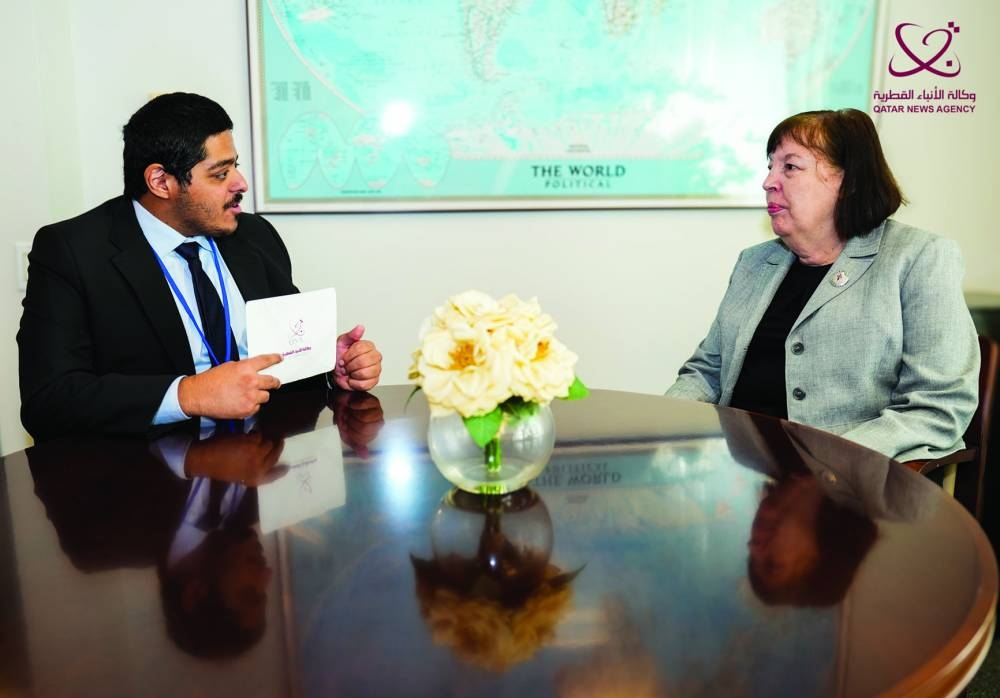The Special Representative of the United Nations Secretary-General for Children and Armed Conflict, Virginia Gamba, praised Qatar’s collaboration with the United Nations in supporting children’s education and protecting them from the abuses they face due to wars, highlighting Qatar’s mediation efforts in resolving conflicts in various countries.
Gamba said the UN body recognised early on that the best way to enhance their efforts with those of Qatar, on the behalf of children who are used and abused during wars, is to establish the Analysis and Outreach Hub of the Office of the Special Representative of the Secretary-General for Children and Armed Conflict (OSRSG CAAC).
She added that the office has a physical presence in only two regions globally, one in Europe and the other in Doha, emphasising the office’s role in amplifying engagement with conflict parties, advocating for public awareness, capacity building, and launching global initiatives from Doha, not just for the Middle East.
She explained that the office supports mediation and negotiations, which Qatar has become very good at, including ceasefire negotiations, advocating for humane treatment of individuals, and reuniting children separated by conflict.
She commended Qatar’s co-operation with the centre in achieving goals aimed at protecting children from violations worldwide.
Additionally, she noted that last year, a regional meeting was held under the Arab League to address serious violations as a standard for the entire Middle East, along with in the fifth anniversary of the International Day to Protect Education from Attack (IDPEA), hosted by Her Highness the Chairperson of Education Above All (EAA) Foundation Sheikha Moza bint Nasser, in Doha.
Regarding the qualitative initiatives launched by Qatar to protect children in conflict zones, Gamba said that Qatar is an exceptional country.
Gamba pointed out she works with countries worldwide, but there are things Qatar does that she want to highlight and appreciate, adding that Qatar leads public awareness on why education is a fundamental strategic need for the world and emphasises the importance of protecting it.
She pointed to the EAA Foundation, launched by Her Highness Sheikha Moza bint Nasser, as perhaps the most significant strategic step in education.
This is alongside the efforts of Qatar Foundation for Education, Science and Community Development, which implements practical projects, training, assistance, and resources for building peace, as well as helping people rehabilitate and recover after conflict.
Gamba highlighted the pivotal role of the Qatari Ministry of Foreign Affairs in creating a safe space for conflict parties to discuss ceasefires, reunite children with their families, and vulnerable individuals.
Qatar’s quiet diplomacy is truly impressive, she said explaining that as the UN office for children and armed conflict, they developed operational guidelines for all mediators to bring children’s issues into negotiations as they arise, and they have a partnership with the Qatari Ministry of Foreign Affairs regarding this, especially concerning how vulnerable children with disabilities are during conflict.
Another crucial issue is the prevention of child recruitment or involvement in violence through controlling the digital environment and cybercrime.
She mentioned the third edition of the National Human Rights Forum organised by the National Human Rights Committee (NHRC) last week in Doha, which discussed ways to incorporate children’s rights into the digital space, address related violations, and manage social media access to children who may be wrongly recruited by inappropriate individuals, while also criminalising offenders. This is alongside numerous initiatives aimed at criminalising child abduction and their use in warfare.
Gamba said every country in the world wants to claim that it protects education and seeks to provide the best education for its children, but what Qatar is doing goes beyond just the ability to educate children; it pertains to the fundamental rights outlined in the Convention on the Rights of the Child, which states that every child from birth to 18 has the right to an education free from harm and fear.
She added that Qatar has pushed this right to its limits, viewing education not only as a strategic asset for future development but also as a strategic commitment to stopping attacks on education, explaining that when you attack education, you prevent a country from developing and securing its future.
Concerning the war in Gaza and the suffering of children, the Special Representative confirmed that the UN has paid a heavy price in protecting children in Gaza with limited resources, adding that efforts have been made to communicate with all parties to prevent violations against children and alleviate their suffering.
She expressed regret that, despite all efforts, there has been a 155% increase in confirmed violations against children in Gaza this year.
Consequently, the UN has reached out to all parties to try to prevent and halt such actions and alleviate children’s suffering, which is extremely challenging due to access difficulties, ongoing military operations, and insecurity, she explained, noting that the UN has lost many of its staff. She emphasised the importance of reaching a ceasefire, monitoring, reporting, and ensuring access to children.

